The Bullmastiff is a breed that combines strength, intelligence, and loyalty, making it a favored choice for families seeking both a protective guard and a loving companion. Known for its imposing presence and tender nature, the Bullmastiff is more than just a deterrent; it's a devoted member of the family. This article delves into the origins, traits, and care requirements of the Bullmastiff, providing potential owners with all the information needed to understand this noble breed.
Breed Summary
Origin of the Bullmastiff
The Bullmastiff was developed in England during the late 19th century by crossing the English Mastiff with the now-extinct Old English Bulldog. The breed was created to assist gamekeepers in guarding estates and apprehending poachers. Known as the "Gamekeeper's Night Dog," the Bullmastiff was valued for its bravery, stealth, and immense loyalty. Unlike many breeds, the Bullmastiff was bred not to bite but to hold intruders at bay until help arrived.
Appearance
Bullmastiffs are robust dogs with a powerful build, standing 24 to 27 inches tall at the shoulder and weighing between 100 to 130 pounds. They have a short, dense coat that can be fawn, red, or brindle, often with a distinctive black mask on their face. Their broad, wrinkled forehead and alert expression convey both intelligence and strength, while their overall physique is one of power and agility.
Temperament
Despite their formidable appearance, Bullmastiffs are known for their calm and affectionate demeanor, particularly towards their families. They are confident and fearless when protecting their home but are otherwise gentle and docile, especially around children. Early socialization and consistent training are crucial to ensure they become well-adjusted adults, as their protective instincts can be strong.
Health Outlook
Bullmastiffs typically have a lifespan of about 8 to 10 years. They are prone to certain health issues such as hip and elbow dysplasia, lymphoma, and gastric torsion (bloat). Their skin folds can trap moisture and debris, leading to infections; regular cleaning and maintenance with a premium dog shampoo can help prevent skin conditions and promote overall skin health. Regular veterinary check-ups are essential to monitor and manage these potential health problems.
Nutritional Requirements
The dietary needs of a Bullmastiff must be carefully managed to prevent obesity, which can exacerbate joint issues. A high-quality diet rich in proteins and balanced in fats and carbohydrates is essential. Including a complete healthy multivitamin can support their overall health, particularly in areas like joint health, digestion, and immune system strength.
Exercise Requirement
Despite their size, Bullmastiffs do not require excessive exercise. Moderate daily activity, such as walks or short play sessions, is sufficient to keep them healthy and content. They are not particularly energetic but do enjoy being active with their families, especially in fenced areas where they can roam safely.
Pros and Cons of Owning a Bullmastiff
Pros:
- Excellent guard dogs, naturally protective of their families.
- Gentle and affectionate with family members, good with children.
- Relatively low exercise requirements compared to other large breeds.
Cons:
- Can be stubborn; require firm, consistent training.
- Prone to serious health issues that can be costly to treat.
- Their size and strength can be challenging to manage for inexperienced owners.
Space Requirements
While Bullmastiffs can adapt to smaller living spaces like apartments, they thrive in homes with more room to move and a securely fenced yard. They need space to stretch and play but are relatively inactive indoors.
Suitability for Elderly
Due to their size and strength, Bullmastiffs may not be suitable for elderly owners unless they are experienced with large breeds and can manage their physical needs.
Suitability for Kids
Their gentle nature makes them excellent companions for children, but their large size means interactions should always be supervised, especially with younger children.
Cost
The cost of a Bullmastiff puppy typically ranges from $1,000 to $2,000, depending on the breeder's reputation and the lineage of the puppy. Potential owners should also consider the ongoing costs of healthcare, nutrition, and maintenance.
What Should the Owner Be Like?
An ideal Bullmastiff owner should be confident and experienced in handling large breeds. They should be prepared to invest time in training, socialization, and health care to ensure their Bullmastiff is both happy and healthy.
Fun Facts
- The Bullmastiff has a remarkable ability to remain silent and stealthy until needed, a trait developed during its early use in estate protection.
- Despite their tough exterior, Bullmastiffs are known as one of the most affectionate breeds towards their owners.
Conclusion
The Bullmastiff is a loyal protector and a loving family member rolled into one. For those who can meet their needs for leadership, care, and companionship, a Bullmastiff offers unmatched devotion and peace of mind as a guardian of the home.
Are you familiar with the Bullmastiff or have this wonderful breed in your family?
Share your stories in the comments!
Share the Article with friends!





